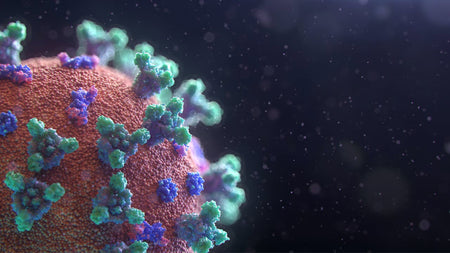Amazon and the Coronavirus remind us that failure should be an option
/
SARS-CoV-2 is a relatively slow learner. The virus accumulates only two single-letter mutations per month in its genome. That means it changes at about half the speed of the flu and a quarter the speed of HIV. Learner is too strong a word. The virus isn’t really “learning” at all. The changes are random and most of them either make it less dangerous or have no meaningful impact on its ability to survive.

But the important thing is it does change. It might not be learning, but it’s constantly buying lottery tickets. And every now and then it picks the right number. That’s why there are currently a couple of new variants floating around that have scientists concerned. But this article isn’t about the pandemic. It’s about the importance of running experiments in the world of business.
Consider this quote from Jeff Bezos:
“As a company grows, everything needs to scale, including the size of your failed experiments. If the size of your failures isn’t growing, you’re not going to be inventing at a size that can actually move the needle.”
Notice how he assumes there will be experiments and there will be failures. For him and Amazon it’s non-negotiable. It’s part of how they do business and ultimately part of the reason they have succeeded over the long term.
The problem at most companies is that “failure is not an option”. Imagine if the Coronavirus never changed. It would never have mutations that made it worse. It would also never become more lethal or more infectious. It would be a sitting duck for our vaccine programs. It certainly would not have produced the recent variants that appear to be at least somewhat resistant to a couple of our vaccines.
It’s ironic that a company that tries avoiding failure at all cost is essentially locking in failure in the long run. Jeff Bezos explains in one of his annual letters to shareholders how Amazon used what they learned from failing with the Fire to build the successful Echo and Alexa product lines.
In the long run, there is no success without failure. And there is no failure without experimentation. At Amazon, “failure is not an option” has a completely different meaning. For them, it means that experimentation and the resulting failures are not optional. It is essential to their ability to grow and change and succeed over the longer term.
It must be noted that Jeff himself emphasises they want to be as smart about their bets as they can. That is a key advantage businesses have over the Coronavirus. They can run controlled experiments. Amazon’s products, service models and business processes are not randomly mutating from one day to the next. They can apply their minds and learnings from recent successes and failures to their next “mutations”.
But mutate they must. And mutate they do. The question for you is: Does my business have any failed experiments I can point to as evidence that we are taking the kind of risks that will help us succeed in the long term? If not, we may have to take a fresh look at COVID and Amazon and remind ourselves just how critical failure is to success.
